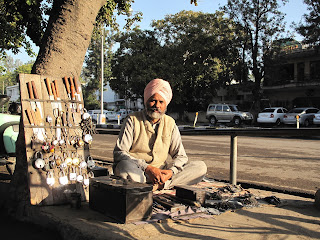Informal Sector in India...
You look up and see what type of workers you see around yourself. You see a cobbler, a barber, a vegetable vendor, a rag picker. You see around and you will find that most of your day to day work is carried out by an informal worker. This is the plight of workers, they work much harder and whole day and earn petty amounts to survive themselves. They don't have a Sunday off or a holiday in their schedule because holiday for them is not leisure day but a pressure day.
Indian Economy is Characterised by the huge size of the informal sector. As per the latest ILO-India, Labour Market Update (2016) and NSSO data (2011-2012) the Informal Sector in India comprises of more than 90% of the total workforce in agriculture and more than 70% of the workforce in the non-agricultural sector in India.Thus the informal sector in India is not a residual sector but rather a dominant one which cannot be and should not be ignored if India want to develop,
Even though the share of the Informal sector in India is a dominant one the share of the informal sector in National Income is meager which you can accept likely to be the case.
Thus in India, the share of the Informal sector is not likely to decrease in the near future. So then what should be the best strategy to cope up with this huge sector.
Thus in India, the share of the Informal sector is not likely to decrease in the near future. So then what should be the best strategy to cope up with this huge sector.
The recent reports have shown that when the formal sector was lagging behind it was the informal sector of India which was providing the much-needed support to the Indian economy in terms of employment, technological up gradation and capital accumulation. Thus this shows that there is huge potential within the sector, if utilised and channeled properly the sector instead of becoming a burden can become a driver for Indian growth story.
At present, the biggest challenge that the Indian economy is facing is that of jobless growth. In this aspect also the informal sector can bring some respite.
But it would be bad to follow such precedence as the sector is not equipped with the required saftey nets for the workers. Being dependent on it for job creation can lead to a situation of digging another hole for the future India to fall in.
Thus a better approach can and should be to improve the potential of the formal sector. But this will take time. So in short run, the economy can rely on the informal sector. Since the focus of the government policy has always been focussed on the formal sector, which is good, but the informal sector should not be neglected. During the transition phase, the government should try to provide the informal workers with a proper safety net in the economy.
Providing the much-required safety net should not be misinterpreted as regulating the sector. As an attempt to bring the sector within the tax net will kill the available sector and with it the lives of many people who are dependent on it.
Rather attempts should be made to improve the skills of the people in this sector and provide them required safety nets such as insurance, health safety etc. The government should provide credit support and technology so that these sectors over time can improve their productivity and formalize themselves over the time.


Comments
Post a Comment